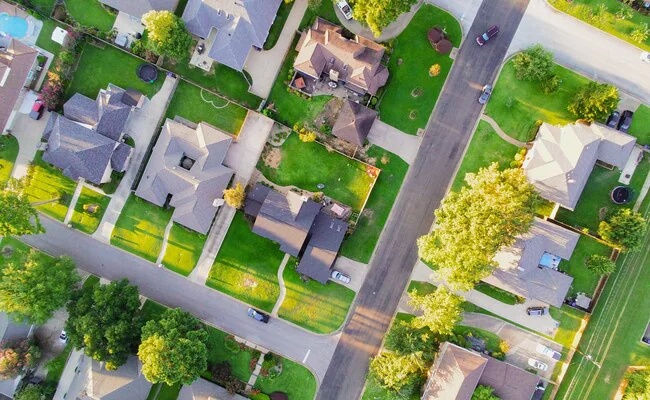Money
These US States May Ban Chinese, Other Country’s Citizens From Buying Land

The Texas proposal also would bar Russians, Iranians and North Koreans from owning real estate. But the principal target appears to be Chinese nationals.
The US state of Texas is considering barring Chinese citizens from buying property on national security grounds — and as tensions with Beijing rise other states may follow suit. The Texas proposal also would bar Russians, Iranians and North Koreans from owning real estate. But the principal target appears to be Chinese nationals.
The draft proposal was offered up in November 2022 by Republican Lois Kolkhorst, a state senator in Texas in the southern US.
«One of the top concerns for many Texans is national security and the growing ownership of Texas land by certain adversarial foreign entities,» Kolkhorst has said.
Governor Greg Abbott, a fellow Republican and fierce advocate of more severe immigration policies, says he will sign and enact the proposal if it passes the state senate.
‘Blatant discrimination’
Foreign ownership of farmland and other real estate, particularly by Chinese citizens or businesses, is becoming a hot issue in the United States, and not only in Texas. Florida, Arkansas, South Dakota and eight other states are considering legislation to restrict foreign ownership.
Texas, though, may be a bellwether. With 28.8 million citizens, Texas is the second most populous state. Of its residents, 1.4 million define their ethnicity as Asian, and 223,500 say they are of Chinese origin, US census data shows.
Houston, the fourth largest US city, has 156,000 residents who identify as Asian.
They include US citizens with Asian heritage but also Chinese permanent residents — or green card holders — who are not naturalized citizens.
«All these people are paying taxes here,» said Ling Luo, a first-generation Chinese immigrant who is director of the Asian Americans Leadership Council. «(They) are paying a tremendous contribution to the universities, to education.»
Even though the proposal also targets other nationalities, Luo said the Chinese are most numerous.
Others say ethnic Chinese are simply the target of discrimination du jour.
«Our country goes through these waves of finding immigrant groups… to demonize,» said Gene Wu, a member of the Texas House of Representatives.
He noted that «China is Texas’s second largest trading partner. And China is the third largest purchaser of Texas goods.»
A proposal like the one on the table, he said, «could jeopardize all of those contracts.»
A rise in tensions
Increased diplomatic tensions after the US shot down an alleged Chinese surveillance balloon over the weekend may boost efforts to restrict foreign real estate ownership, Wu said.
«There’s some people who are using the rise in tensions as an excuse to come after community members,» said Wu, adding, «there is a difference between people with Chinese heritage and the government of China.»
Kolkhorst, who proposed the Texas legislation, said the spark behind the bill was the purchase of 130,000 acres (52,600 hectares) by a retired Chinese army officer linked to the Communist Party.
The land is near Laughlin Air Force Base east of Del Rio, a city near the border with Mexico.
Sun Guangxin, the real estate tycoon who was the buyer, said he wanted to build a wind and solar farm, but Texas in 2021 blocked the project.
The state legislature, citing national security concerns, passed a law that barred any project linked to the governments of China or the other three nations from connecting to the grid.
Wu said that law «made sense,» but the new proposal affects a broad class of people and the ends don’t justify the means.
According to the National Association of Realtors, in the 12 months until March 2022, Chinese investment represented six percent of foreign residential purchases in the United States.
‘Not written on your face’
«Our family didn’t just come from China, we fled from China,» Wu said. «My family went through the Cultural Revolution and all that stuff,» he added, referring to the 1966-1976 period of upheaval as communist leader Mao Zedong sought to purge all rivals.
Senator Kolkhorst said that her proposed bans would not affect people with US citizenship or permanent resident status nor anyone «fleeing the tyranny» in their homelands.
For Luo, though, such statements are not convincing — even to US citizens like herself.
«Who knows if you’re a citizen or you aren’t a citizen? It’s not written on your face. Your Chinese face is what makes people come and abuse us, hate us, to beat us up,» she said.
Money
They Call Me «Dragon» in the Crypto Community: Dragan Pajić Remarkable Journey

In the world of cryptocurrencies, Dragan Pajić, known as «Dragon,» has emerged as a prominent figure, earning him a well-deserved reputation in the Balkans and beyond. As the largest crypto influencer in the region, serial entrepreneur, and owner of the renowned 100X Club, Dragan has empowered thousands of individuals through his informative YouTube channel, demonstrating how they can multiply their investments by 100 times in the crypto market.
Through his marketing agency, DigitalPR, which has thrived for the past decade, and his rapidly-growing herbal brand called «Bonaturo,» Dragan has made a significant impact on both the digital marketing landscape and the health industry. Famous singers, actors, and public figures have not only embraced but also endorsed his brand, cementing his position as a trusted name in the market.
Dragan Pajić entrepreneurial ventures go beyond the crypto and marketing realms. He has diversified his investment portfolio, venturing into solar power plants, properties, and unicorn projects. Currently, he is an active investor and co-founder of Daopeople, the first decentralized web 3 social media platform based in Dubai.
Exciting times lie ahead for Dragan as he prepares to launch his long-awaited 100X Crypto Academy for a global audience. This groundbreaking educational platform will equip individuals with the knowledge and skills required to navigate the crypto market successfully.
Dragan Pajić achievements have not gone unnoticed. In 2018, he was recognized as one of the ten most influential young people in Bosnia.
Having accomplished his first million-dollar milestone in his twenties, he now holds the title of the Balkans’ most influential crypto influencer.
Looking toward the future, Dragan aims to empower even more young individuals, providing them with financial freedom and education in the domains of entrepreneurship, business, crypto, and investing. His ultimate goal is to become the first founder of a unicorn company (worth over $1 billion) from the Balkan region.
Connect with Dragan Pajić on his social media channels to stay updated on his latest ventures and insights
Instagram: https://instagram.com/draganpajic1?igshid=MzRlODBiNWFlZA==
Facebook: https://www.facebook.com/draganpajic1?mibextid=LQQJ4d
Twitter: @Dragan_Pajic
Money
Meet the cheapest US states to buy a house

A new study analyzing Zillow data has found that the monthly median sale price of a house last year was more than $500,000 in Utah, California and Colorado — and more than a staggering $800,000 in Hawaii.
The study, conducted by Studio City realtors, found that Hawaii clocked in as the most expensive state in the U.S. for homebuyers. On the island, the average home price was $805,775 — hundreds of thousands of dollars more than the cheapest state on the list.
Studio City realtor Tony Mariotti noted that market turbulence contributed to a “significant increase” in house prices across the U.S.
Home prices went up nationwide in February after months of declines amid low inventory and a small uptick in demand — and experts have said they expect affordability will continue to be a problem for prospective homebuyers in the months ahead.
Here are the priciest and cheapest U.S. states to buy a home:
The most expensive states to buy a home
Eight states and Washington, D.C., saw a monthly median sale price of a house last year of $400,000 or higher, with Oregon sitting at that exact figure.
Washington state, Nevada, Montana and Washington, D.C., came in between $402,900 and $487,500.
California, Colorado and Hawaii were the top three most expensive, at $537,000, $537,125 and $805,775 in monthly median sale prices last year, respectively.
Costs differed in different areas within states: for example, the median monthly sale price of a house last year in California’s cheapest city of Red Bluff was $320,000 — while the ticket in its most expensive city of San Jose was $1,370,000.
Money
Don’t just hug a tree this Arbor Day — plant one, too

Nearly five years ago, Hurricane Michael became the first Category 5 storm to hit the United States in 25 years. It left a trail of destruction in its wake, and my community of Panama City — located in the Florida Panhandle — was hit especially hard. Since then, working together as neighbors and citizens, we’ve made significant progress in key recovery areas, including rebuilding key and vital infrastructure, enhancing quality of life, developing our downtown, and attracting new businesses across a mix of industries. However, one of our most important recovery efforts lies within our tree canopy restoration — an often overlooked but vital area of disaster recovery and prevention.
When Hurricane Michael uprooted nearly 80 percent of Panama City’s trees — approximately a million trees, generating 5.7 million cubic yards of debris within the city — it created serious challenges. Not only did we lose the beautiful canopy from 100-year-old oak trees, but the vital function of the trees was lost, the first of which was the absorption of groundwater. The loss of so many trees significantly increased the risk of flooding in our community,
where we now experience flooding in areas that haven’t typically flooded in the 114-year history of the city. The second function lost from the lack of trees is shade.
Trees serve to mitigate the urban heat island effect, where an entire city is warmed by concrete being heated by the sun. These increased temperatures not only result in uncomfortably hot weather but can also lead to other extreme weather events like wildfires. Since the storm, Panama City has experienced increased flooding whenever thunderstorms roll through, in addition to wildfires that consumed over 40,000 acres last year – both due in part to the damaged tree canopy and loss of trees.
-

 Leadership2 años ago
Leadership2 años agoBrain Behind Multi-Million Dollar Beauty Brands Launches Skin Care Line for Women 50+
-

 Lifestyle2 años ago
Lifestyle2 años agoDuty Free Dynamics adds yoga brand Manduka to its lifestyle portfolio
-

 Innovation2 años ago
Innovation2 años agoMelinda Herron Created a Niche for Marketing Men’s Grooming Products, Launches 103 Collection in National Retail
-

 Innovation2 años ago
Innovation2 años ago“The Millionaire Maker”
-

 Innovation2 años ago
Innovation2 años ago5 Innovative Mother’s Day Gifts for the Beauty Lover in Your Life
-

 Small Business2 años ago
Small Business2 años agoThree Questions Small Business Owners Should Ask In Creating A Workplace Culture – Forbes
-

 Real Estate2 años ago
Real Estate2 años agoStartups Are Looking To Fractionalize Real Estate Assets, But Should They? – Forbes
-

 Real Estate2 años ago
Real Estate2 años ago30 Israelis make Forbes 2022 billionaires list, led by Miriam Adelson
